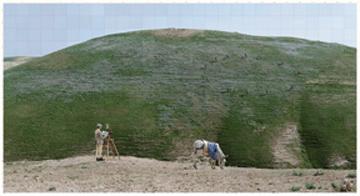
Israeli artist Yuval Yairi remembers Kansas City.
He lived here as a child with his family from 1969 to 1970. His father had been invited to study at the U.S. Army Command and General Staff College at Fort Leavenworth, Kansas.
Now, Yairi will travel from Israel and return to Kansas City as a renowned photographer and filmmaker for a Visiting Artist Residency from Nov. 7 through Nov. 16 at the Epsten Gallery at Village Shalom. The gallery will present “Yuval Yairi: Surveyor,” a solo exhibition featuring 16 of his photographs, from Nov. 13 through Jan. 22, 2017. The photographs are part of his current “Surveyor” series and its precursor, “Land.”
The gallery will have its public opening from 1 p.m. to 4 p.m. Sunday, Nov. 13, and Yairi will give a talk there at 2 p.m.
He also will spend time with Kansas City Art Institute students during his visit to Kansas City. He will also show a short film and a video selection of his photographs and talk about his approach to artistic expression and his focus on the exploration of place in the context of memory at the final program of his residency, from 6:30 p.m. to 8:30 p.m. Monday, Nov. 14, at the White Theatre of the Jewish Community Center of Greater Kansas City (The J).
“I have always felt most comfortable and natural expressing myself through visual language — drawing, photography or video,” Yairi said. “For the past 15 years, since I decided to focus only on my artistic practice, leaving behind a career as a graphic designer in a studio which I shared with Noa, my wife, I have been investigating places.
“These places are geographically located near me but also serve other ideas and interests that I wish to explore,” he said. “Some are very personal, biographical or imaginary, but these themes also have wider, broader aspects which relate to the society I live in and to common topics, political, cultural, etc.”
Yairi said the subject of memory had always interested him, “what we choose or are being forced to remember, the interaction or maybe conflict between photography and memory.”
“Is a photo a memory aid or maybe it replaces our memory with a selective still image, causing us to forget the true event we are trying to capture?” he said. “How do we create collective memory or what remains in our collective memory? It’s the process of memorizing, remembering and recollecting, the manipulation or different perspectives of historical events.”
Many of Yairi’s works show the connections he finds between memory and place, “whether it is a museum under construction, an old leper hospital or a hill in the Judean desert.”
“I relate to these connections through the way I describe and photograph them, through the techniques I use and by joining different elements in my photographs that may suggest such connections,” he said.
Yairi said he was curious to see how people in Kansas City would interpret his work in the exhibit because his subjects are intimately Israeli.
“But it is always interesting to see it from a different perspective and through the eyes of people from a very different background than mine,” he said. “It adds another layer of looking at the subjects and also helps me see things differently.”
“Surveyor” might be especially challenging for viewers and has been challenging for him, he said, because “it deals with events in my life and thoughts, which are difficult to describe directly and therefore have been transformed and encrypted and now symbolized by a set of codes and hints.”
“For some viewers, this won’t matter, as they are invited to suggest their own interpretations and connotations to the images,” he said.
Yairi’s work is important to Kansas City’s Jewish community because he is a native Israeli artist who lived here as a child and his work gives them “a connection with someone who lives in Israel and provides his thoughts and experience with his homeland,” said Heather Lustfeldt, the Epsten Gallery’s curator.
The “Surveyor” exhibit is a “complicated body of work that involves photography and the complicated journey that he has had both in his life and in becoming an artist and dedicating his life to it,” Lustfeldt said.
“It’s hyper-realistic but also abstract, defining moments in our lives and the slippage of time,” she said.
Bill Kort, board president of the Epsten Gallery Foundation, said he was excited to have Yairi visit Kansas City and to present his exhibit at the gallery because of Yairi’s international reputation and the attention it will bring to the gallery, which he called “not just a Jewish community asset but an asset for the whole community.”
“His images are unique and thought provoking, and his work should have broad appeal to the community,” Kort said.
Yairi loves his work, he said, and he feels “very lucky being able to dedicate myself to doing my art projects, and lucky to have opportunities to show and exhibit in various places.”
“Many talented artists are not as fortunate as me and rarely get a chance to show their creation,” he said. “In my meetings with the audience and visitors in Kansas City, I will try to show and explain the way I work. Hopefully, I’ll do it more by showing images than by talking. I will try to take the viewers to a journey through my projects, and hopefully people will understand what my work is trying to say.”



